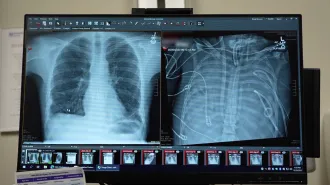Bug bites suggest new stroke drug
A treatment for strokes that result from blood clots may be on the horizon, thanks to the parasitic lifestyle of blood-sucking arthropods.
To keep the blood flowing, creatures such as ticks and mosquitoes inject a victim with enzymes called apyrases. Their job is to degrade adenosine diphosphate (ADP), which an animal’s body uses at a wound site to recruit platelets that form a clot.
People possess an apyrase similar to the ones in bloodsucking insects, but it normally degrades compounds other than ADP. Min Lu of the Weill Medical College of Cornell University and his colleagues recently determined the shape of this human enzyme and compared its active region with those of insect apyrases. By mutating the gene encoding the human enzyme, they made a version whose active region mirrors that of the insect enzyme.
The new protein degrades ADP 100 times as readily as the original human enzyme does and is a potent inhibitor of platelet aggregation, Lu’s team reports in the March 5 Cell. The researchers are testing whether the upgraded enzyme can treat strokes experimentally induced in rodents and monkeys.







